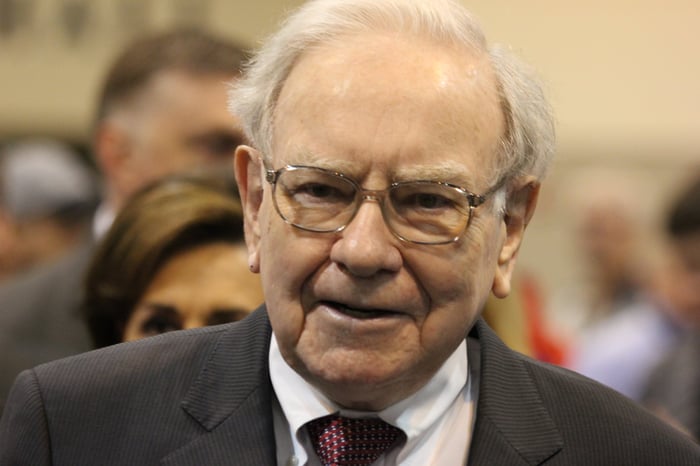Over the past year, Warren Buffett's Berkshire Hathaway (NYSE: BRK.A) (NYSE: BRK.B) sold a lot of its top stocks to boost its cash position to an all-time high. Those moves were worrisome since Buffett once told investors to be fearful when others are greedy, and greedy when others are fearful.
But even as Berkshire reduced its exposure to big names like Apple and Bank of America, it has still been increasing its exposure to some cheaper evergreen stocks. One of those is the American-Swiss insurance giant Chubb (NYSE: CB).

Berkshire Hathaway CEO Warren Buffett. Image source: The Motley Fool.
Berkshire bought its first 8.1 million shares of Chubb in the third quarter of 2023. It increased that position by 12 million shares in the fourth quarter of 2023, 5.8 million shares in the first quarter of 2024, and 1.1 million shares in the second quarter of 2024.
Berkshire's 27 million shares of Chubb are now worth nearly $7.7 billion, and that 6.7% stake in the company accounts for 2.6% of its entire portfolio. Let's see why Buffett is so bullish on Chubb, and why this seemingly boring stock might make you a lot richer.
Why Buffett loves insurance companies
Buffett transformed Berkshire Hathaway from a struggling textile maker into a massive conglomerate over the past six decades. A major driver of that transformation was the shutdown of its textile business and the expansion of its insurance business.
Today, Berkshire directly owns insurance companies like GEICO, Gen Re, Alleghany, Wesco, and National Indemnity. Its insurance underwriting and investment businesses accounted for 40% of its total operating earnings last year.
Buffett likes insurance companies because they directly generate more cash for his investment portfolio. They collect up-front payments for future claims, and they can invest that cash (known as the "float") for their own benefit before claims are filed.
Berkshire's float rose 4% year over year to $174 billion in the third quarter of 2024, while its cash, cash equivalents, and U.S. Treasuries soared 132% to $272 billion. That's why it isn't surprising to see Berkshire increase its exposure to a top insurer like Chubb as it reduces its exposure to other companies.
Chubb has a resilient business model
Chubb is the world's largest publicly traded provider of property, supplemental, health, and casualty insurance policies. It's based in Zurich, employs about 40,000 people, and operates in 54 countries and territories. The current version of the company was created after ACE Limited acquired the original Chubb and inherited its brand in 2016.
From 2016 to 2023, Chubb increased its revenue at a compound annual growth rate (CAGR) of 7% while its earnings per share had a CAGR of 14%. It maintained that steady growth even as the pandemic, geopolitical conflicts, inflation, and rising interest rates rattled the broader economy.
That's because most of its customers won't simply cancel their insurance policies to save a few dollars. Economic downturns might limit their pricing power, but the market leaders can usually resist that short-term pressure. Over the past three years, Chubb's consolidated net premiums grew by double digits as its core operating income growth accelerated.
|
Metric |
2019 |
2020 |
2021 |
2022 |
2023 |
|---|---|---|---|---|---|
|
Consolidated net premium growth |
5.5% |
4.8% |
12% |
10.3% |
13.5% |
|
Core operating income growth |
7.1% |
(27.7%) |
7.8% |
21.3% |
48.5% |
Data source: Chubb Limited.
In the first nine months of 2024, Chubb's consolidated net premiums rose another 10.1% year over year as its core operating income grew 13.8%. That robust growth was driven by its rising property and casualty underwriting, life insurance, and investment income.
Analysts expect Chubb's core operating income per share to grow 11% in 2024 and 7% in 2025. Based on those expectations, the stock still looks dirt cheap at 12 times forward earnings. It also pays a decent forward dividend yield of 1.3%.
It could make patient investors a lot richer
Chubb won't ever become a high-growth stock. But over the past eight years, it still rallied 125%, generated a total return of 162%, and bought back 13% of its shares. Those slow but steady gains make it a great stock for long-term investors to buy and forget.
Don’t miss this second chance at a potentially lucrative opportunity
Ever feel like you missed the boat in buying the most successful stocks? Then you’ll want to hear this.
On rare occasions, our expert team of analysts issues a “Double Down” stock recommendation for companies that they think are about to pop. If you’re worried you’ve already missed your chance to invest, now is the best time to buy before it’s too late. And the numbers speak for themselves:
- Nvidia: if you invested $1,000 when we doubled down in 2009, you’d have $380,291!*
- Apple: if you invested $1,000 when we doubled down in 2008, you’d have $43,278!*
- Netflix: if you invested $1,000 when we doubled down in 2004, you’d have $484,003!*
Right now, we’re issuing “Double Down” alerts for three incredible companies, and there may not be another chance like this anytime soon.
*Stock Advisor returns as of November 18, 2024
Bank of America is an advertising partner of Motley Fool Money. Leo Sun has positions in Apple and Berkshire Hathaway. The Motley Fool has positions in and recommends Apple, Bank of America, and Berkshire Hathaway. The Motley Fool has a disclosure policy.
The views and opinions expressed herein are the views and opinions of the author and do not necessarily reflect those of Nasdaq, Inc.


